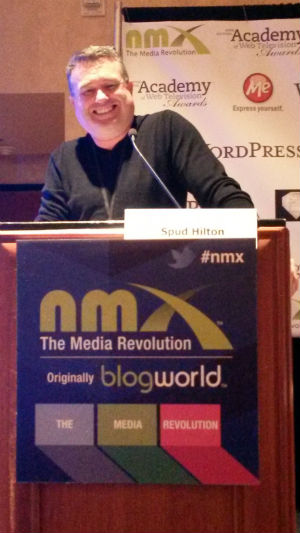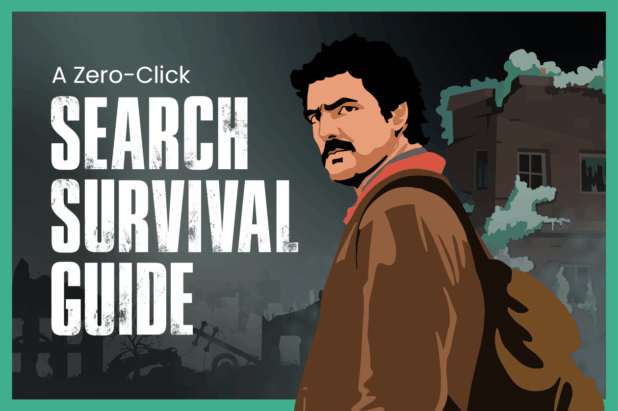 Fortune cookies are notoriously cheesy. They tend to be something that could happen to anyone (e.g. you’ll meet someone special today) or something extremely vague (e.g. there is a big success in your future). But what if they could teach you how to become a better blogger and a better writer?
Fortune cookies are notoriously cheesy. They tend to be something that could happen to anyone (e.g. you’ll meet someone special today) or something extremely vague (e.g. there is a big success in your future). But what if they could teach you how to become a better blogger and a better writer?
Spud Hilton made it so they could. While in San Francisco, he had tips printed and folded inside the sugary cookie to pass out to random strangers. He dedicated his NMX session to teaching those 12 tips, and elements of good writing to help bloggers up their writing game.
Why Quality Matters:
People will tire of you before they tire of the topic. Your topic is always going to have more longevity than you do. You need to make sure you’re presenting that topic in a straightforward way that’s unique.
Those people want to read blogs by people that sound smarter than them. If you’re not writing well, presenting yourself in an intelligent manner, you’re missing out on an audience and essentially leaving behind people who feel that they want to read something by someone smarter than them. Knowing your audience is the important piece—write to that and understand how elements fit into that.
Elements of Good Writing:
- A Point: Writing has to prove a point (premise, angle, nutgraf). Every element has to—down to the captions. When you start to write something you have to know what the purpose is. In order to find it, ask yourself 3 questions:
- Why do I want to write this post? Because I want to inform? Engage? Because I want hits? What are you trying to do?
- Who’s the audience? New media takes a lot closer look at who the audience is than more traditional media.
- What’s the message you want readers to take away? The trick is once you answer this, you have the point.
- Observations: There’s a difference between observation and description. A description is the facts. A photo can describe visually but it can’t make an observation. That’s why it’s such an important element. It’s an interpretation of the situation and makes your writing more interesting. But you have to mix them with reporting and narrative because Hilton says, “Observation without narrative and reporting is basically an unsupported rant.”
- Reporting: You need to know if your story is false—you have to do the actual reporting. Look up info from some other source to verify what you’re talking about. It’s not enough to just have you support you. That’s how fake news stories get picked up by so many publications. Every time that happens the credibility of all writers drops. Hilton points out that, “Reporting without narrative and observation is Wikipedia. It’s a list of facts and doesn’t tell your story.”
- Narrative: This is whatever format your story is in and who it’s told by (e.g. first person, third person). Narrative without observation and reporting is your diary. We’re in the age of sharing and putting yourself out there and really getting into people’s personal everything—but no one wants to read your diary.
Fortune Cookie Tips:
- Grab the reader’s attention and grab it now! Grab it by the throat. You absolutely can’t bore a reader at the beginning of a story. More than ever it’s important to grab their attention immediately. If you just start with context and the background of your topic, it won’t grab anybody.
- Zen editing: When is it done? The great thing about zen—it’s not done when you’ve put everything you can into it. It’s done when you’ve taken everything out of it. Filtered content—things that you made decisions on—is going to be better than if you just leave everything in.
- Prose is the frosting, not the cake. Everybody gets bogged down in prose—telling things in a pretty way. But it’s not the point. It’s frosting—it’s the extra stuff you put on. You still have to have a good story to tell, a good point, something to say.
- Be creative with context. When you have a lot of facts,and are trying to explain something big or why it is superlative—how do you do it? Be creative with context—taking things you talk about all the time that are plain, and do some reporting to make them interesting. Metaphors and comparisons are great for this!
- Where is the emphasis? You have to figure out where the emphasis of your sentence, caption, paragraph, and story is and pay attention to that. What is the point?
- Avoid brochure speak. Take a more authentic, forward role in your vocuabulary. If you start with a question, people associate it mentally with advertising and a brochure, but you want them to feel like they’re getting the real thing. Showing that you’re quality over time will help you keep readers. Use language to your best advantage but if it doesn’t sound like you, it won’t work.
- Check Your A.S.A. It stands for: Action. Storytelling. Aesthetic. It applies to photos and content. Does it have action? Does it tell a story? Is it pretty? You can get away with it if you have one of those things—it’s great if it’s two of those things, but if it has all 3 it’s incredible. If it has none of those things, do you know where it should be published? Nowhere. You grossly overestimate your own photos and your own content because you know the context behind them. Go back and ask yourself: will people understand what I’m trying to say.
- Does it need to be about you? Make sure you’re presenting the topic, not you. Try to present the topic without talking about yourself. Then go back and sprinkle judiciously and sprinkle in a few “I”, “me”, and “we”.
- Find the humor. Snark gets tiring really fast. It will only take you so far. What you want to look for is the absurdity of a situation and point it out. How do you find it? Using observations and a little reporting of course!
- Did you stay on point? And did you kill the bunny? You’re getting ready to write a great post and you’ve stayed on point, except there’s one little thing you REALLY want to put into it but it doesn’t fit. It’s your bunny. Don’t try to force things that don’t belong into your story. Hilton says, “Kill your bunny. Or at least put it into the freezer until you need it later.”
- Read everything twice. Once for fun and the second time to dissect it. Do it with other people’s content too. Find the elements—the attention grabber, the examples, the point. Then you can begin to see patterns emerge and what’s working and be able to emulate it in your own writing.
- Quirky is currency. It’s money in the bank. Think about it. If a nightclub tells you they have bottle service, do you care that much? No probably not. What if the nightclub told you they had a package that included a swanky designer selection of champagne that range in size from 750ml to 30 liters (which weighs 80 pounds by the way and holds the same amount as 40 normal bottles)? That gets through the wall instantly and resonates with people.
You can study SEO until the sun goes down or try the latest trick, but that doesn’t tell you how to keep those readers or how to engage them over the long term. Better quality will do that. Make a commitment to become a better writer and produce more quality content for your readers.
How have you committed to producing quality content over quantity?


